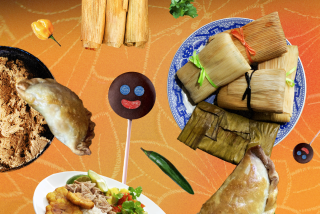Defying the pandemic, Latinos missing loved ones travel to their homelands for the holiday
On a recent cold morning, Amarilys Ortiz felt a surge of nervous happiness. En route to her mother’s house, her heart pounded like a drum.
She was paying a surprise visit that she’d planned with her daughter, a reunion with the woman in her 80s who’d given Ortiz life but now lived 2,810 miles away, in Guatemala City.
“I thought that it wasn’t ever going to happen again,” said the 57-year-old Santa Monica resident.
Her mother, Alicia Herrera, was turning 89, and Ortiz had arrived in Guatemala still bearing memories of a recent stay in a Southern California hospital ward where she’d been treated after testing positive for the coronavirus.
The pandemic’s furious spread has forced many Latinos like Ortiz to postpone trips to their homelands, to sacrifice birthdays, to skip fiestas, to miss weddings, anniversaries, funerals and births — to put locks on the doors of emotions connecting them to Mexico, Central America or elsewhere.
For the surprise visit, Ortiz showed up with a bunch of balloons to conceal her face and a bouquet of flowers, accompanied by other celebrants carrying a loudspeaker. Opening the door of the house where Ortiz’s mother and sister live, everyone burst into “Las Mañanitas.”
“When she saw me, she started to cry,” Ortiz said. “I didn’t let go of her, and she didn’t let go of me.”
At that moment, Ortiz was able to blot out the ordeal that she had suffered at the Culver City medical center.
“Being here, I could forget all that and be with my family,” said Ortiz, who now is looking forward to celebrating Christmas in her homeland.
In normal years, the winter holidays mark a high point for the travel industry for Latinos. Initially, the pandemic shut down most nonessential travel across the region, and a number of Latin American airports closed entirely for months.
U.S. citizens now are permitted to visit Honduras, Guatemala and El Salvador if they can provide proof of a negative COVID-19 test taken no more than 72 hours before arrival. Mexico does not require Americans to take a coronavirus test or to quarantine upon arrival, which has contributed to a recent tourism surge to popular spots like Los Cabos and the so-called Mayan Riviera.
Latinos began visiting their homelands in greater numbers last fall, but the post-Thanksgiving explosion of U.S. cases has kept travel below normal levels — though still high enough to worry health officials.
“Ticket sales have diminished, so prices are very low right now,” said Esther Alvarado, the Salvadoran owner of Sky Tours & Travel Inc., an L.A. firm that primarily books passage to Central America. “We are in a season that people were buying, but these new measures have caused people not to travel.”
Yanett Navarro, who operates Yanett Travel in Paramount, said her air travel sales to Mexico were down 70%, and other destinations are down 80%.
As U.S. and California officials are urging Americans to stay home during the winter holidays and avoid gathering even with family members of different households, the Mexican government also is telling its citizens living in the U.S. to forgo visiting their homeland.
“If you don’t have an emergency, if it’s not a question of work, you don’t have to move from place to place,” said Marcela Celorio, consul general of Mexico in Los Angeles, in a message addressed to her compatriots.
According to a 2019 report by the Mexico tourism office, 58.3% of visitors traveling by air to the country reside in the United States; the majority are Mexican immigrants who are vacationing and visiting their families.
Each year, since 2004, Eva Novoa has visited Los Reyes, in the western Mexican state of Michoacán, to unite with her brothers and many of her husband’s relatives for Christmas and New Year’s.
“Right now, our family is planning to make typical Mexican dishes, tamales and pozole,” said the Paramount resident shortly before departing for her homeland. “In other years, we’ve made birria and carnitas when many people are invited, but right now it’s only the family that’s close by.”
Novoa, 47, had planned to have her daughter Saraí’s 15th birthday celebration in Michoacán on Dec. 26. But seeing that the COVID-19 alert was still in effect in both Mexico and the United States, the family canceled the event. Guests who’d been invited to come from the United States for the party suspended their travel plans, but the family is now preparing to travel there to get together with relatives for the holiday.
“All of us were thinking that by the end of the year this wouldn’t be so hard,” she said.
Her daughter’s quinceañera had been planned since February. In July, Novoa traveled to Mexico to check on preparations for the banquet hall, her daughter’s dress and outfits for her young attendants. The event has been moved to next year, but the family’s Christmas reunion trip is underway. While her husband travels by land, Novoa is going by plane with her daughter and two nephews.
In the region where her family lives, awareness of the pandemic is low. Even so, guests will be offered plenty of hand sanitizer, and everyone will be required to wear a mask.
“They think I’m overreacting,” Novoa said.
Despite the risk of traveling at this time, Javier Salmerón visited El Salvador just before Thanksgiving Day. Twice, he had to change the flight dates of a trip he had planned since the beginning of 2019. The idea was for his children to meet their 78-year-old grandfather, Don Juan Manuel Salmerón, who lives in the country’s eastern region, not far from the Honduran border.
“Going to see my daddy is what we all wanted, that my daddy could see his nietos,” said the native of Santa Rosa de Lima. Salmerón, his wife and their children also ate rice pupusas in Olocuilta and feasted on seafood in Puerto de La Unión.
“The only thing we wanted was to give him emotional support,” Salmerón said of his father, who has been widowed since 2018.
Despite the health risks, expert advice and official orders, many Southern California Latinos — weary, like so many others, of the pandemic and yearning to spend time with loved ones at this time of year — are seeking relief from the confinement by visiting relatives in their homeland.
Mario Matute, a therapist and member of the board of directors of Pacifica Hospital of the Valley, says the search for closeness during the holidays is an emotional requirement that people may “want to satisfy at any cost.” Severe stress and emotional damage can result from the “deprivation of giving or receiving a hug,” he said.
“The lack of affection, hugging and being close to a loved one causes depression more than everything,” said Matute. “When one is near loved ones, their emotional problems can suddenly disappear.”
Amarilys Ortiz’s mother cried when she saw her daughter, whom she never expected would show up in Guatemala after being hospitalized for 12 days with COVID.
Ortiz has two sisters, two daughters and seven grandchildren still living in Guatemala. She thought of them all when she left the hospital on July 29. When La Aurora International Airport reopened in the capital, Guatemala City, Ortiz’s first thought was to travel to see her family. But she waited to arrive until Nov. 19, one day before her mother’s birthday.
“I needed this hug to continue living,” Ortiz said of her mother’s embrace.
More to Read
Sign up for Essential California
The most important California stories and recommendations in your inbox every morning.
You may occasionally receive promotional content from the Los Angeles Times.










